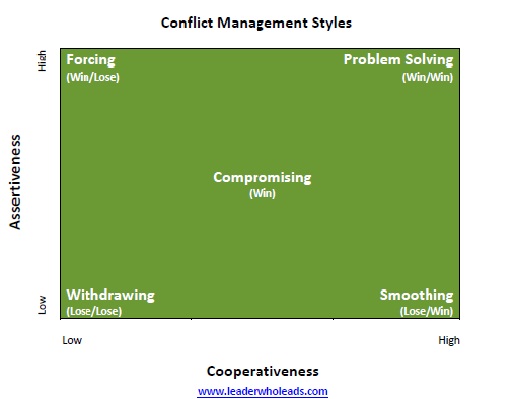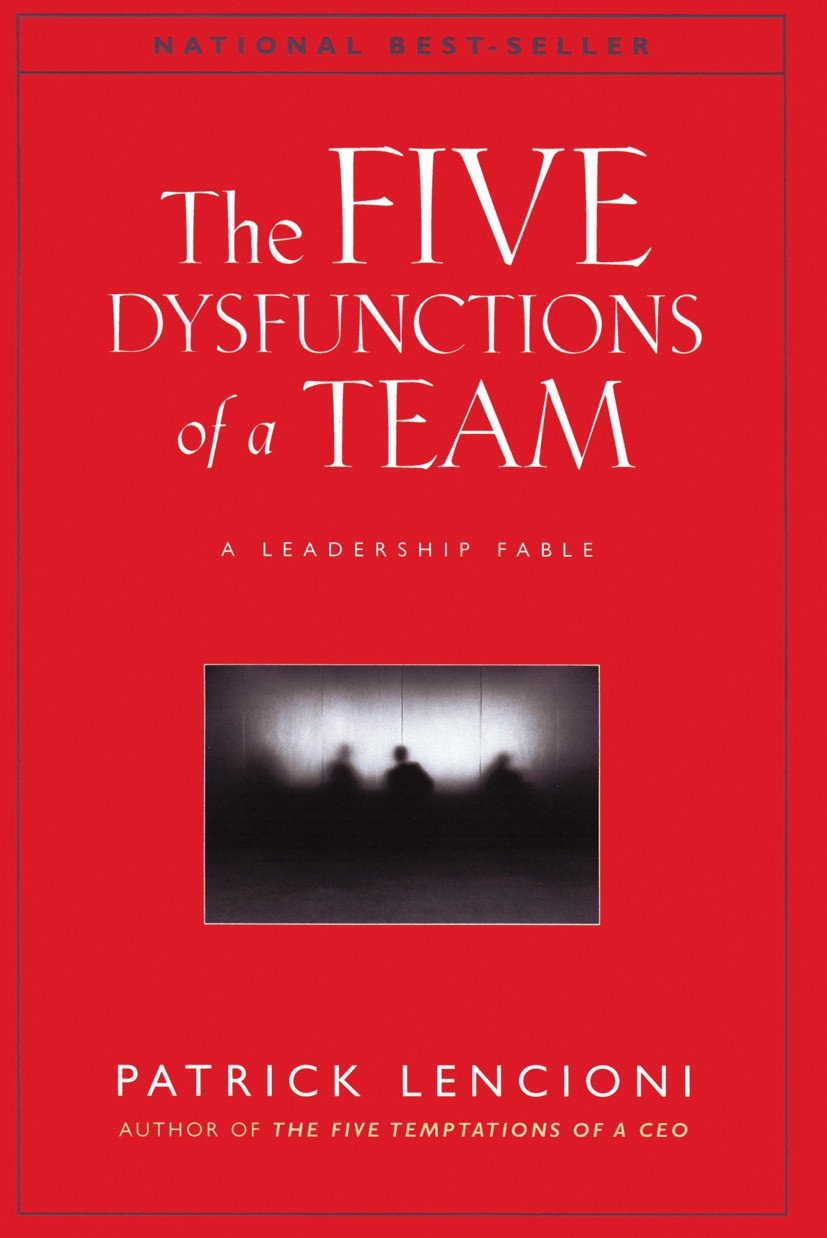Conflict Management Styles
In the heat of battle, such as in a heated debate, it can be difficult to respond calmly and confidently. Your conflict management styles will dictate whether you respond or react.
The Conflict Management Styles explored here are based on the Thomas-Kilmann Model and will give you helpful insight into better understanding yourself, as well as the person with whom you're engaged in conflict.
According to Thomas-Kilmann, there are five styles which are listed below:
- Forcing
- Withdrawing/Avoiding
- Smoothing
- Compromising
- Problem Solving
The visual below shows how these styles compare to Covey's six paradigms of human interaction.
Dimensions

These styles of conflict management are measured along two dimensions: Assertiveness and Cooperativeness.
Assertiveness relates to one's concern for their own interests.
Cooperativeness relates to one's concern for the other's interests, or the interests of the person with whom they are dealing.
I find it helpful to compare these styles to Stephen R. Covey's Paradigms of Human Interaction.
Conflict Management Styles
Forcing
The person who uses Forcing is very high on asserting their needs and taking care of their interests and concerns, without minimal regard for the person or persons sitting across the table.
At this extreme, it is "Aggressiveness" and can destroy hopes of building or maintaining a good working relationship.
Forcing compares to Covey's paradigm of "Win/Lose," which says the way I win is for me to get my way and for you to lose.
Smoothing
At the other extreme from Forcing, is Smoothing. The person with this conflict management style is so cooperative they will give away everything, especially to the person who is so assertively demanding their way.
This person with this style usually compromises to the point that they lose their "voice" and will not assert themselves or stand up for their own best interests.
I liken this style to Covey's paradigm of "Lose/Win." I lose so you can win.
Withdrawing
The person who engages in withdrawing avoids conflict altogether. They do not assert their desires, neither do they listen to the desires of the other person. They simply refuse to talk or clam up.
They disengage.
By withdrawing from the situation, they avoid effectively dealing with the conflict/disagreement.
I liken this style to "Lose/Lose."

Compromising
Compromising is a blend of both assertiveness and cooperativeness. The person wants to "Win" but is not necessarily interested in the other person losing. They mean no harm to the other person, but they are not interested in helping the other person make their case.
It is a much better choice than either of the three mentioned above. It takes into consideration the interests of both parties, but produces inferior results when compared to the next style: Problem Solving.
Problem Solving
Problem solving takes time, but it is often time well spent. The person with this style takes into account the interests of both parties and seeks what is in the best interest of all concerned. The person with this style is willing to "drop the rock."
In my estimation, it is akin to what Stephen Covey describes as "Win/Win" and "Win/Win or No Deal" paradigms.
This style requires that a person is concerned about their interests AND the interests of the other person. As Covey states, "Win/Win is a belief in the Third Alternative. It's not your way or my way, it's a better way, a higher way."
Indeed, problem solving is "a better way, a higher way" when approaching conflict between two parties who must work together to achieve maximum success.

Summary
So, based on what you've read, what's your conflict management style? With which of the following do you most closely associate?
- Forcing
- Withdrawing/Avoiding
- Smoothing
- Compromising
- Problem Solving
Although I would love to tell you that Problem Solving is my go-to style when managing conflict, it isn't. In reality, my response (or reaction) to conflict can depend upon the circumstance. Bottom line, we engage in more than one of the styles listed above.
Coach Gwen's Corner
Honestly, there are times when withdrawing from or avoiding the conflict has been my best option. That is especially true under certain conditions such as:
- I don't have a vested interested in the topic.
- I don't believe it is the best (nor wisest) use of my time, attention and energy.
- I don't have the bandwidth to engage in a constructive conversation. By engaging, I increase the odds of doing more damage than good.
At times I have avoided conflict when, in hindsight, I wished I had stepped up to the plate at the time. Can you relate?
The beautiful thing about most situations is that it is possible to get a "do-over" or second chance to rectify the situation. That was the case, especially with my boss or supervisor.
One of your most important relationships at work is the one with your boss. Keeping that relationship free of clutter due to unresolved conflict is of utmost importance. Why? Because your relationship with your boss or director affects your daily experience at work, as well as opportunities to grow. Plus, unresolved conflict serves as unnecessary baggage.
It can be tempting to avoid conflict with someone in authority, but it can be detrimental over time. Learning to manage and resolve conflict will prove to be a boon to your career. It did for mine.
Take a moment to assess your relationship with your boss. The assessment below will help you detect and disarm the land mine of unresolved conflict.
Improve Your Relationship with Your Boss
Are you looking to improve your relationship with your boss? If so, the Boss Relationship Worksheet will help you better understand and communicate more effectively with your immediate supervisor.
To download your copy, submit your information on the form below.
After completing the Boss Relationship Worksheet, you will find that the following will prove helpful in showing you how to cultivate a better working relationship with your boss:
 |
I published my first book and I am beyond excited.
Get your FREE copy of Called to Lead!
ORDER PRINT HERE
Leaders don't
create
followers.
Leaders
create
other
leaders.
- Tom Peters













